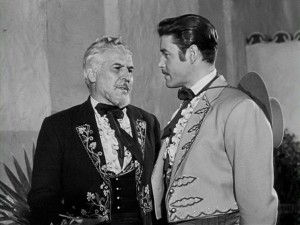Obviously, I was aware that there was more to his career than being Don Alejandro. There are some people on the show who didn’t do much more than that, but they’re mostly minor performers who are on one or two episodes. The major performers may not have had the most illustrious careers in the history of Hollywood, I grant you, but still. It wasn’t a surprise to me that George J. Lewis had been kicking around the movie industry since the silent era. Some of the specifics, though, are considerably more surprising.
Astonishingly, he was actually born in Guadalajara. His mother was Mexican; his father was an American executive from a typewriter company. They moved to the Midwest during the Revolution. This meant that young George (about my son’s age when they moved) spoke both fluent Spanish and unaccented English, which meant that, though his silent career was successful, he was well placed for the coming of sound. He’s the sort of person you’d come across and be fascinated by their career; he was, in fact, in the last two-reel comedy short made in Hollywood, which was also one of three shorts he made with the Three Stooges.
He made about forty shorts about a series of characters called “The Collegians,” which was showing the same characters going through four years of college. In fact, he made a lot of serials, mostly playing the henchman. He was also one of those people who was apparently from everywhere; he was a guard in the 1952 Prisoner of Zenda and a guy named Giovanni in Captain Carey, USA and “Haggling Arab Monkey Seller” in Casablanca. He played a lot of Spaniards and Mexicans, a fair number of Italians, a lot of Arabs and Native Americans. I think he played guys named “Duval” twice.
And, okay, he was Don Alejandro. It wasn’t even his first version of Zorro; he’d been in the 1944 serial Zorro’s Black Whip and 1949’s Ghost of Zorro. But mostly, people remember him as Don Diego’s feisty dad. And don’t get me wrong; that’s a lot of episodes and he’s really good at it. While the show only technically lasted two seasons, he was in forty-eight episodes. How many seasons does that come to these days?
While Lewis, who retired in 1969 and lived nearly thirty years after that, was heavily involved in the Great Western Boom of the ’50s, it turns out he also connects to the considerably less pervasive superhero book of today. Because in 1944, Marvel gave production rights to Captain America to Republic Pictures in hopes of selling more comics—proof of how the media landscape has changed, really. One of the villain’s henchmen was played by Lewis. And then his last film role was as a Spanish ambassador in the ’66 Batman. And, of course, Zorro is the overlap between the two crazes.
On some episodes, Don Alejandro was called a Patrón; you know he’d contribute to my Patreon or Ko-fi!

